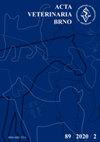犬胃肠道寄生虫和肺虫发生的影响因素及抗寄生虫药物使用模式的评估
IF 0.7
4区 农林科学
Q3 VETERINARY SCIENCES
引用次数: 0
摘要
狗是具有不同致病性和人畜共患风险的寄生虫的宿主。本研究的目的是通过对饲主进行问卷调查和检查犬粪,评估可能影响犬内寄生虫感染发生的因素。根据狗主人的反应,我们评估了预防和治疗使用抗寄生虫药物的方法。每只狗取一份粪便样本(共391份),然后采用浮选法、幼虫镜法和聚合酶链反应(PCR)法进行检测。我们的重点是人畜共患绦虫多房棘球绦虫和带绦虫。狗主人的问卷回答显示,狗主人最常不定期(96.4%)给狗驱虫,即一年两次(24.3%)。在粪便学检查中检出贾第鞭毛虫、奥氏囊异孢子虫复合体、犬新孢子虫/海绵毛虫、犬弓形虫、犬弓形虫、毛线虫、毛线虫、血管管圆线虫、狐皮Crenosoma vulpis、钩虫和带绦虫,在391份PCR检测的粪便中有4份带绦虫DNA阳性。其中3个获得了序列,100%证实与稻叶霉同源。人畜共患蠕虫犬弓形虫(Toxocara canis)最为常见(A、B、C组分别为9.3%、4.3%、1.9%)。由于具有人畜共患的可能性,我们认为3份狗粪便样本中存在严重的绦虫。本研究中收集的数据表明,由饲养者自行决定的对内寄生虫的预防不足以确保其狗的健康或覆盖人畜共患疾病传播的风险。本文章由计算机程序翻译,如有差异,请以英文原文为准。
Factors affecting the occurrence of gastrointestinal parasites and lungworm in dogs and assessment of antiparasitic drug use patterns
Dogs are hosts of parasites with different pathogenicities and zoonotic risks. The aim of our study was to assess factors that could affect the occurrence of endoparasitic infections in dogs using questionnaires for owners and examining canine faeces. Based on the responses of dog owners, we evaluated ways of the preventive and therapeutic use of antiparasitic drugs. One faecal sample was obtained from each dog (391 samples total), and then examined by flotation, larvoscopic, and polymerase chain reaction (PCR) methods. We focused on zoonotic tapeworms Echinococcus multilocularis and Taenia crassiceps. The answers in the dog owners’ questionnaires showed that owners most often dewormed their dogs irregularly (96.4%), namely, twice a year (24.3%). In coprological examinations the following parasites were detected: Giardia spp., Cystoisospora ohioensis complex, Neospora caninum/Hammondia heydorni, Toxocara canis, Toxascaris leonina, Capillaria spp., Trichuris spp., Angiostrongylus vasorum, Crenosoma vulpis, Ancylostoma spp. and Taenia spp. A total of 4 out of 391 PCR investigated samples of faeces were positive for DNA of Taenia species. Sequences were obtained for 3 of them, confirming 100% identity with T. crassiceps. The zoonotic helminths Toxocara canis were the more prevalent species (9.3%, 4.3%, 1.9% group A, B, C). We consider the presence of T. crassiceps in 3 dog faecal samples to be serious due to its zoonotic potential. Data collected within this study showed that the prevention against endoparasites carried out at the breeders’ discretion is insufficient to ensure the health of their dogs or to cover the risk of zoonotic transmission.
求助全文
通过发布文献求助,成功后即可免费获取论文全文。
去求助
来源期刊

Acta Veterinaria Brno
农林科学-兽医学
CiteScore
1.00
自引率
33.30%
发文量
36
审稿时长
18-36 weeks
期刊介绍:
ACTA VETERINARIA BRNO is a scientific journal of the University of Veterinary and Pharmaceutical Sciences in Brno, Czech Republic.
The scientific journal Acta Veterinaria Brno is dedicated to the publication of original research findings and clinical observations in veterinary and biomedical sciences. Original scientific research articles reporting new and substantial contribution to veterinary science and original methods that have not been submitted for publication elsewhere are considered for publication. A written statement to this effect should accompany the manuscript, along with approval for publication by the author´s head of department. The authors bear full responsibility for the contents of their contribution. Book reviews are published, too.
 求助内容:
求助内容: 应助结果提醒方式:
应助结果提醒方式:


